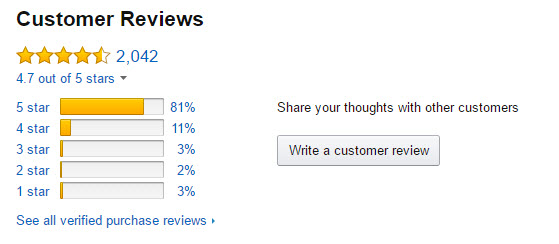Amazon Vine helps new products grow reviews while limiting shopper contact with manufacturers. Amazon wants to make sure that brands can't "buy" positive reviews through other review clubs that might not be as thoroughly regulated.

All Online Reviews Are Not Created Equal
No doubt many legitimate review clubs exist. Many of them, however, give sellers control over which reviewers have access to their products. Reviewers who give products positive reviews are likelier to be chosen to review another product. And since these clubs are a paid service, ipso facto sellers can buy favorable reviews.
ReviewMeta.com recently analyzed 7 million Amazon product reviews. They identified examples of power reviewers who have given hundreds more five-star ratings compared to their ratings with four or fewer stars. They noticed a pattern: reviews containing language indicating that they were likely incentivized were also likelier to be positive. They also found that incentivized reviews were, on average, four times less likely to be critical and 12 times less likely to give a one-star review.
The site also tracked incentivized review volume, and discovered that since Q1 2016, the majority of all new Amazon product reviews fall into this category. The prevalence of paid reviews could be creating a torrent of false positives. Amazon’s search rank algorithm draws heavily on ratings and reviews because they are presumed to be the voice of the consumer. If consumers can no longer make that assumption, then ratings and reviews will become just another form of advertising and will lose their trustworthiness.
Amazon Vine Can Help Restore Trust in Online Reviews
Amazon’s attempts to control and level the reviewing and rating field go beyond restricting incentivized reviews to Amazon Vine. Until recently, anyone with a user account could review products. The site didn’t require more than a login account to write a review on the site. It didn’t even check whether the product was purchased at all (though those purchased through Amazon were automatically identified as a “Verified Purchase”).
Amazon now requires at least $50 worth of purchase history on an account in order to review, and reaction on the seller forum thread has been vocal, with several advocating for a higher purchase history amount. This will help end dummy accounts used by review clubs or suspect sellers, and no doubt the ecommerce giant has further actions planned. I will be watching this closely and it will be interesting to see how Amazon defends itself against these black hat tactics.
Most recently, Amazon took its most aggressive step yet by outright banning incentivized reviews. This was a major blow to an entire ecosystem built up around helping sellers and brands boost reviews. For the best of them, this doesn’t mean their end. ReviewKick, one of the more popular reviews programs for 3rd party sellers, has already updated their policies and made recommendations that both comply with FTC disclosure rules while also complying with Amazon’s new policy. A statement such as “I received this product at a discount for testing purposes, but in no way was I required to write a review” might be sufficient to meet both policies.
But all of that is only the battle we all hear about in the press. There is also a silent battle Amazon is waging against the suspect reviewers themselves, in their effort to preserve customer trust in reviews left on Amazon. During the course of some deep analytics Clavis undertook as part of the roll out of our new Shopper Review Diagnostics capability, we observed that review counts didn’t always rise over time as new reviews were added. Within time frames, we observed counts could also go down. This might be expected if Amazon removes a review for not being compliant with policies. But we started noticing decreases of 1-5% in review counts in any given time period!
As it turns out, beginning as early as 2015, Amazon began taking additional actions against suspect reviewers on the site. This included “wiping out all of their reviews and removing their reviewing privileges.”
A Reddit board called “The Great Amazon Purge” board tracks the activity of bots that regularly crawl Amazon to find, identify, and weed out suspect reviewers, and the forum posts a day-by-day list of purged reviewers. As of this writing, Amazon has purged more than 500 reviewers from this list. Many reviewers have been purged from the elite “Top Reviewer” ranks – the highest I’ve seen thus far was ranked #12 of all of Amazon’s hundreds of thousands of reviewers!
How Clavis Helps Brands Utilize Reviews
First and foremost, Clavis recommends brands continue to leverage retailer programs like Amazon Vine. As mentioned above, it has a proven positive impact on search results, and is a critical element of any marketing and merchandising plan. Further, for brands still looking for third party help, we recommend avoiding non retailer endorsed providers, and giving careful vetting and consideration to those they do work with. BzzAgent, from dunnhumby, is an example of a company looking at this in a more robust way than others, often executing programs in partnership with both brands and the retailer. Their sampling program only targets qualified audiences and provides the reviewers with product information that goes beyond the product sample itself.
And lastly, brands can’t afford to take a passive role in monitoring reviews. There are clear actions and benefits brands must take to understand what shoppers are saying, and responding accordingly. By using Clavis' Shopper Review Diagnostics, brands can measure syndicated vs organic reviews, set up trigger words to monitor for the appearance of words that may indicate a positive ("perfect," "love," or "great") or negative ("reaction," "irritation," "smell," or "damage") experience with a product, and set up alerts that funnel directly into customer care centers, R&D, marketing, or PR.
Read part one of this series, A Matter of Trust: Amazon Declares War on Fake Product Reviews.




